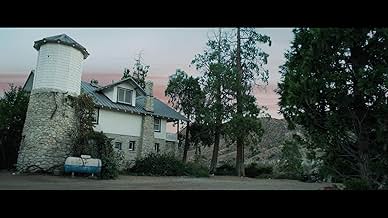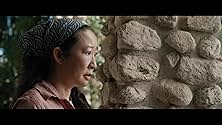IMDb-BEWERTUNG
4,7/10
11.396
IHRE BEWERTUNG
Amanda und ihre Tochter führen ein ruhiges Leben auf einer amerikanischen Farm, doch als die Überreste ihrer entfremdeten Mutter aus Korea eintreffen, wird Amanda von der Angst verfolgt, sic... Alles lesenAmanda und ihre Tochter führen ein ruhiges Leben auf einer amerikanischen Farm, doch als die Überreste ihrer entfremdeten Mutter aus Korea eintreffen, wird Amanda von der Angst verfolgt, sich in ihre eigene Mutter zu verwandeln.Amanda und ihre Tochter führen ein ruhiges Leben auf einer amerikanischen Farm, doch als die Überreste ihrer entfremdeten Mutter aus Korea eintreffen, wird Amanda von der Angst verfolgt, sich in ihre eigene Mutter zu verwandeln.
- Auszeichnungen
- 1 wins total
Hana Marie Kim
- Young Girl
- (Synchronisation)
Danielle K. Golden
- Paramedic
- (Nicht genannt)
Mark Kirksey
- Paramedic
- (Nicht genannt)
Empfohlene Bewertungen
I love Sandra Oh, and I love Korean horror films. I thought that this was going to be a match made in heaven, but honestly calling it a horror movie is almost offensive.
Umma is predictable, boring more times than not, and all around just a lame attempt at something that could be amazing.
Umma is predictable, boring more times than not, and all around just a lame attempt at something that could be amazing.
What happened? The first half of the movie was so solid, interesting story, good acting, beautiful cinematography, great chemistry between the two leads, then the second the daughter came out of the basement and questioned her mother, the dialogue became very clunky and unnatural.
We were then confronted with some very unscary CGI and all the promise the film once held just fizzled away.
There was definitely a much better film in here somewhere. Such a shame.
We were then confronted with some very unscary CGI and all the promise the film once held just fizzled away.
There was definitely a much better film in here somewhere. Such a shame.
Umma can be an interesting study of motherhood and generational trauma with a dash of a touch of folk horror. After a promising start, alas Iris K. Shim is unable to maintain the tension or the emotional aspect it's direly in need throughout the rest of the film. In the end, it presented a rather dull, if not bland, third act.
It seems like the film's modus operandi was to make statements on childrearing. Specifically made for those parents who are overbearingly conservative about their children, so much so that they even refuse to listen to their kids' wishes, let alone lend an ear to what other people say.
As creators, they tried to put their message out in the open, an important one as well and to tell you the truth, I see nothing wrong in that. However, I also do believe that as a filmmaker you bear certain responsibilities, some obligations one of which is to stay loyal to the genre or the type of content you are making.
"Umma" was meant to be a Horror right? In any case that was the impression, I've got from the trailers! If you wanna have social commentary, and symbolic insinuations in your film that's fine but you got to stick to your promise first! At the end of the day, What do people expect from a Horror feature? All they want is to be terrified, to get the chills. So if that particular wish remains unattended, I don't see why should it be marketed as horror in the first place then!
As creators, they tried to put their message out in the open, an important one as well and to tell you the truth, I see nothing wrong in that. However, I also do believe that as a filmmaker you bear certain responsibilities, some obligations one of which is to stay loyal to the genre or the type of content you are making.
"Umma" was meant to be a Horror right? In any case that was the impression, I've got from the trailers! If you wanna have social commentary, and symbolic insinuations in your film that's fine but you got to stick to your promise first! At the end of the day, What do people expect from a Horror feature? All they want is to be terrified, to get the chills. So if that particular wish remains unattended, I don't see why should it be marketed as horror in the first place then!
UMMA explores the complexities of mothers and daughters, toxic relationships, the fear of abandonment, and inherited trauma. There are light spoilers ahead. Written and directed by Iris Shim, with Sam Raimi producing, the film follows Amanda (Sandra Oh), a Korean immigrant and single mother, who lives on a secluded farm with her daughter Chrissy "Chris" (Fivel Stewart). They are almost completely isolated from the outside world, keeping bees and selling honey. Amanda has homeschooled and sheltered Chris for most of her life in a futile attempt to keep her close. The two share an intense bond, that for Amanda stems from deep-rooted trauma.
As a child, Amanda was abused by her mother, locked in a room, and punished with electrified wires for running away or misbehaving. When Chrissy was an infant, fearful of becoming her mother and repeating abusive habits, Amanda shut off the electrical box under her house. Determined to prevent the atrocities she suffered from happening to Chris, she also concocts a lie about a sensitivity to electronics to ensure they can live an electricity-free life.
Amanda has suppressed her childhood trauma. Her uncle arrives from Korea, to deliver her Umma's (Korean for mother) ashes in the hopes that she will perform a Jesa ceremony to put her mother's soul to rest. Her uncle explains that Amanda's mother cried out for her as she died, triggering Amanda's fear and anxiety response to her trauma. She hears echoes of the abuse she suffered, her mother's voice whispering in her ear, visions of her mother's ghost, and waking nightmares. I believe that the ghost of her mother and the haunting aren't reality, but a psychological manifestation causing delirium and manic delusions.
Amanda is suffering from post-traumatic stress that is compounded by the discovery that Chris wants to leave for college. Amanda fears that she will be abandoned which only amplifies her desire to keep Chris close, even if it means fracturing their bond. She projects her fear onto their relationship, and the more she fights against the dissolution of their co-dependency, the more toxic their relationship becomes. This in turn mirrors Amanda's relationship with her mother, and causes her acute distress. It isn't difficult to relate to having a complicated and dysfunctional relationship with your mother. Chris needs to assert her independence, breaking free from the claustrophobic isolation of the farm, feeling othered, and her mother's somewhat suffocating love. Moving away to attend college is a logical way to escape her situation and an attempt to do so without hurting her mother's feelings.
UMMA doesn't fail to communicate any of its core themes, but they are muddied by the film's lack of tension, and poorly executed jump scares. There's a little too much going on with the way the haunting is represented, which often broke my ability to immerse myself in the narrative. Certain cliches and cultural stereotypes, including the appearance of a Kitsune or Gumiho were perplexing at best. In Korean mythology, the nine-tailed fox is an evil seducer of men, whereas, in Japanese folklore, it is an evil fox with paranormal abilities that can shapeshift into human form. The fox seems meant to symbolize Umma (MeeWha Alana Lee) but is a poor addition to the film's third act. Oh delivers a stunning performance as the tormented Amanda, her portrayal of anguish and fear is easily believed, while the other performances leave much to be desired.
While the supernatural horror film is a mediocre missed opportunity, its themes make it worth a single viewing. Audiences shouldn't expect a film that will instill terror, but one that uses its horror elements to explore putting what haunts you to rest.
As a child, Amanda was abused by her mother, locked in a room, and punished with electrified wires for running away or misbehaving. When Chrissy was an infant, fearful of becoming her mother and repeating abusive habits, Amanda shut off the electrical box under her house. Determined to prevent the atrocities she suffered from happening to Chris, she also concocts a lie about a sensitivity to electronics to ensure they can live an electricity-free life.
Amanda has suppressed her childhood trauma. Her uncle arrives from Korea, to deliver her Umma's (Korean for mother) ashes in the hopes that she will perform a Jesa ceremony to put her mother's soul to rest. Her uncle explains that Amanda's mother cried out for her as she died, triggering Amanda's fear and anxiety response to her trauma. She hears echoes of the abuse she suffered, her mother's voice whispering in her ear, visions of her mother's ghost, and waking nightmares. I believe that the ghost of her mother and the haunting aren't reality, but a psychological manifestation causing delirium and manic delusions.
Amanda is suffering from post-traumatic stress that is compounded by the discovery that Chris wants to leave for college. Amanda fears that she will be abandoned which only amplifies her desire to keep Chris close, even if it means fracturing their bond. She projects her fear onto their relationship, and the more she fights against the dissolution of their co-dependency, the more toxic their relationship becomes. This in turn mirrors Amanda's relationship with her mother, and causes her acute distress. It isn't difficult to relate to having a complicated and dysfunctional relationship with your mother. Chris needs to assert her independence, breaking free from the claustrophobic isolation of the farm, feeling othered, and her mother's somewhat suffocating love. Moving away to attend college is a logical way to escape her situation and an attempt to do so without hurting her mother's feelings.
UMMA doesn't fail to communicate any of its core themes, but they are muddied by the film's lack of tension, and poorly executed jump scares. There's a little too much going on with the way the haunting is represented, which often broke my ability to immerse myself in the narrative. Certain cliches and cultural stereotypes, including the appearance of a Kitsune or Gumiho were perplexing at best. In Korean mythology, the nine-tailed fox is an evil seducer of men, whereas, in Japanese folklore, it is an evil fox with paranormal abilities that can shapeshift into human form. The fox seems meant to symbolize Umma (MeeWha Alana Lee) but is a poor addition to the film's third act. Oh delivers a stunning performance as the tormented Amanda, her portrayal of anguish and fear is easily believed, while the other performances leave much to be desired.
While the supernatural horror film is a mediocre missed opportunity, its themes make it worth a single viewing. Audiences shouldn't expect a film that will instill terror, but one that uses its horror elements to explore putting what haunts you to rest.
Wusstest du schon
- WissenswertesThe nine-tailed fox, or kumiho, is a mythological creature similar to the Japanese kitsune and Chinese huli jing. In Korean lore, however, it is always evil.
Top-Auswahl
Melde dich zum Bewerten an und greife auf die Watchlist für personalisierte Empfehlungen zu.
- How long is Umma?Powered by Alexa
Details
- Erscheinungsdatum
- Herkunftsländer
- Sprachen
- Auch bekannt als
- Umma (Mother)
- Drehorte
- Bloom Ranch of Acton, Kalifornien, USA(Acton, CA)
- Produktionsfirmen
- Weitere beteiligte Unternehmen bei IMDbPro anzeigen
Box Office
- Bruttoertrag in den USA und Kanada
- 2.121.025 $
- Eröffnungswochenende in den USA und in Kanada
- 915.290 $
- 20. März 2022
- Weltweiter Bruttoertrag
- 2.232.593 $
- Laufzeit
- 1 Std. 23 Min.(83 min)
- Farbe
- Seitenverhältnis
- 2.39:1
Zu dieser Seite beitragen
Bearbeitung vorschlagen oder fehlenden Inhalt hinzufügen





























